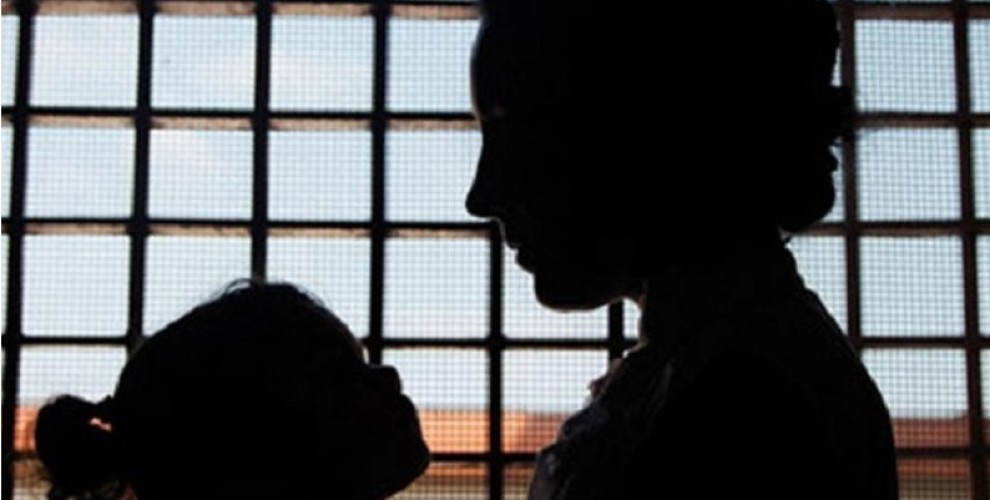Hundreds of children in Turkish jails
According to the Ministry of Justice there were 624 children under 6 in Turkish jails by November 2017
According to the Ministry of Justice there were 624 children under 6 in Turkish jails by November 2017

Injustice and human rights violations in Turkey's prisons has reached a level that can no longer be ignored by international institutions.
Perhaps the most serious of these violations is that referring to the situation of children who have to grow in prison. They stay in jail with their mothers until they reached the age of 6. After many initiatives and parliamentary questions, it has been confirmed that, according to the Ministry of Justice, there were 624 children under 6 in Turkish jails by November 2017 and that the nutritional and living conditions of these children were far below minimum standards.
This figure is variable as children are taken away from their mother after reaching the age of six and mothers are transferred many times.
One of the most recent case was that of Ayşe Çelik Öğretmen, who was arrested and put into prison - together with her newborn daughter - for saying “Stop killing children" in a Tv program on massacres in Kurdistan.
Children who remain in Turkish jails with their mothers until the age of 6 are suffering from psychological and physical conditions as well as having problems both with eating habits and adaptability to the outside world after being separated from their mother. Their staying in prison will leave a mark on them for the rest of their life.
Answering to ANF questions, lawyer Cansu Şekerci (Civil Society Association in the Penal Execution System, Child Network Representative in the Prison) and Dr. Fulya Giray Sözen (Head of the Social Service Department of the Altınbaş University) underlined the fact that children stay in prison till the age of 6, enduring conditions in a place where even adults are constantly and emotionally challenged.
Lawyer Cansu Şekerci, quoted the United Nations High Commissioner for Human Rights report, published in March 2018 and referring to 2017. She said that the chapter on Turkey said the following: "By December 2017, approximately 600 women were being held with their children in Turkey prisons. Some 100 women were pregnant or had newborns”. Quoting the Ministry of Justice, the lawyer confirmed that “there were 624 children in jail as of 14 November 2017”.
Speaking about the situation of children in prisons, lawyer Şekerci added: “The prison has started to provide a children’s menu, which means that yogurt and milk are available but must be purchased, they are not given for free. This means that mothers, who do not have financial incomes, cannot actually buy child-specific products from the ward. The limited response provided by the ministry to the questions concerning this situation also indicates that there is no proper follow up to basic or special needs of the children staying with their mothers. This confirms that Turkey doesn’t meet the standards required”.
Describing the steps needed in order to provide the necessary facilities for children in prison, lawyer Şekerci said that: “there are 8 women closed prisons in Turkey. In addition there are women-only wards in other male prisons. In jails with a high number of children there can be a nursery or playroom, but this is not a standard practice. In addition, the child is not allowed to carry toys outside the playroom or the nursery. Toys cannot be taken to the ward”.
Professor Fulya Giray Sözen recalled the Bangkok Rules released by the UN General Assembly in December 2010, which include criteria for meeting the needs of female prisoners. She said: "The Bangkok Rules contain broad arrangements for the care policy of children imprisoned with their mothers. Member States have agreed on the adoption of the agreement and are expected to fulfill the obligations it contains, which include arranging that the environmental conditions of children imprisoned with their mother should be as close as possible to the conditions of children outside. In the current situation though this is only a theory rule, as the practice tells us otherwise”.
The next critical period for children is the one they have to leave once out of prison: this implies both being separated from their mother and adapt to a completely different and new environment.
Professor Fulya Giray Sözen underlined that this “is bound to influence both their lives, their personality, their choices, their orientations about life. The child had lived a very close relationship with the mother for a long time - she added - and the absence of the mother clearly has a hard impact on children once they reach the age of 6”.
Emotional support is crucial especially because the relationship with other members of the family, during the child’s permanence in prison, is almost non existing or very limited, and the transition of the child to the outside world within a day is a very hurtful experience.
The biggest difficulty, clearly, is to leave the mother, but the child's social environment, related to family members and peers, daily routines, nutrition, sleeping, playing very basic daily practices need to be completely reconstructed.
“For most children - said Professor Sözen - the outside world can be a very fearful and worrying place”. Therefore, to limit damages, it is important that children are provided with authentic relationships, a good role model or a healthy social environment that will compensate for the effects of the prison negative experience.